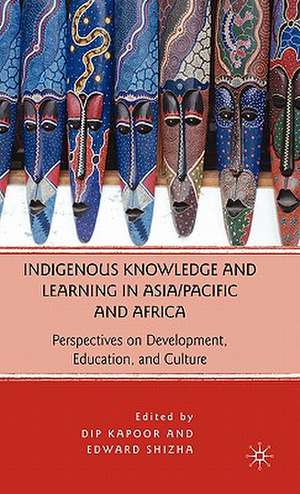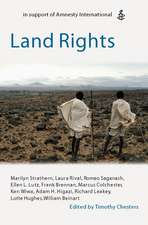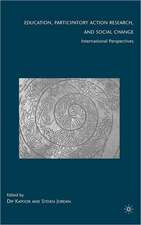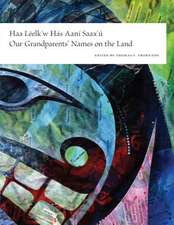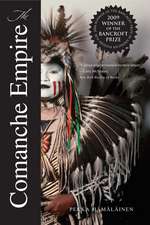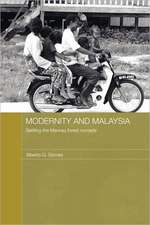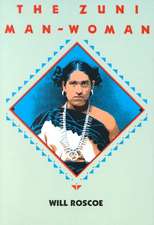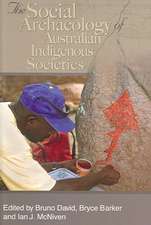Indigenous Knowledge and Learning in Asia/Pacific and Africa: Perspectives on Development, Education, and Culture
Editat de D. Kapoor, E. Shizhaen Limba Engleză Hardback – 18 oct 2010
| Toate formatele și edițiile | Preț | Express |
|---|---|---|
| Paperback (1) | 297.35 lei 3-5 săpt. | |
| Palgrave Macmillan US – 18 oct 2010 | 297.35 lei 3-5 săpt. | |
| Hardback (1) | 302.17 lei 3-5 săpt. | |
| Palgrave Macmillan US – 18 oct 2010 | 302.17 lei 3-5 săpt. |
Preț: 302.17 lei
Nou
Puncte Express: 453
Preț estimativ în valută:
57.86€ • 59.62$ • 48.56£
57.86€ • 59.62$ • 48.56£
Carte disponibilă
Livrare economică 01-15 februarie
Preluare comenzi: 021 569.72.76
Specificații
ISBN-13: 9780230621015
ISBN-10: 0230621015
Pagini: 275
Ilustrații: VII, 275 p.
Dimensiuni: 140 x 216 x 20 mm
Greutate: 0.43 kg
Ediția:2010
Editura: Palgrave Macmillan US
Colecția Palgrave Macmillan
Locul publicării:New York, United States
ISBN-10: 0230621015
Pagini: 275
Ilustrații: VII, 275 p.
Dimensiuni: 140 x 216 x 20 mm
Greutate: 0.43 kg
Ediția:2010
Editura: Palgrave Macmillan US
Colecția Palgrave Macmillan
Locul publicării:New York, United States
Cuprins
Indigenous Knowledge and Learning in Asia/Pacific and Africa: Perspectives on Development, Education and Culture; D.Kapoor & E.Shizha PART I: DEVELOPMENT Learning from Adivasi (original dweller) Political-ecological Expositions of Development: Claims on Forests, Land and Place in India; D.Kapoor Indigenous Incitements; K.Ghosh Against the Flow: Maori Knowledge and Self-determination Struggles Confront Neoliberal Globalization in Aotearoa/New Zealand; A.Choudry Ethnic Minorities, Indigenous Knowledge, and Livelihoods: Struggle for Survival in Southeastern Bangladesh; B.Barua Animals, Ghosts and Ancestors: Traditional Knowledge of Truku Hunters on Formosa; S.Simon Development Enterprises and Encounters with the Dayak and Moi Communities in Indonesia; E.Haque PART II: FORMAL EDUCATION Rethinking and Reconstituting Indigenous Knowledge and Voices in the Academy in Zimbabwe: A Decolonization Process; E.Shizha Education, Economic and Cultural Modernization, and the Newars of Nepal; D.Shakya PART III: LEARNING AND COMMUNICATIVE MEDIUMS Clash of Oralities and Textualities: The Colonization of the Communicative Space in Sub-Saharan Africa; A.Abdi Autonomy and Video Mediation: Dalitbahujan Women's Utopian Knowledge Production; S.Mookerjea Voicing our Roots: A Critical Review of Indigenous Media and Knowledge in Bengal; S.Sekhar Roy & R.Hassan PART IV: GENDER, INDIGENOUS KNOWLEDGE AND LEARNING Haya Women's Knowledge and Learning: Addressing Land Estrangement in Tanzania; C.Mhina The Indigenous Knowledge System (IKS) of Female Pastoral Fulani of Northern Nigeria; L.Usman PART V: HEALTH KNOWLEDGE AND LEARNING Traditional Healing Practices: Conversations with Herbalists in Kenya; N.Wane 'To die is honey, and to live is salt': Indigenous Epistemologies of Wellness in Northern Ghana and the Threat of Institutionalized Containment; C.Agyeyomah, J.Langdon & R.Butler
Recenzii
"With a sterling cast of contributors and insightful studies of indigenous knowledge and learning, Kapoor and Shizha have assembled a volume of careful and outstanding studies. Their collection will be of use to all scholars and decision makers interested in how indigenous knowledge works." - Arun Agrawal, Professor and Associate Dean for Research in the School of Natural Resources and Environment (SNRE), University of Michigan
"A profoundly illuminating and scholarly discourse on indigenous knowledge systems in an Afro-Asian and interdisciplinary context. Kapoor and Shizha have initiated a new era of cross-regional research in a text that should be of interest to development planners, historians, social scientists, and educators." - Gloria Emeagwali, Professor of History and African Studies, Central Connecticut State University
"A profoundly illuminating and scholarly discourse on indigenous knowledge systems in an Afro-Asian and interdisciplinary context. Kapoor and Shizha have initiated a new era of cross-regional research in a text that should be of interest to development planners, historians, social scientists, and educators." - Gloria Emeagwali, Professor of History and African Studies, Central Connecticut State University
Notă biografică
Dip Kapoor is an associate professor, International Education, in Educational Policy Studies, University of Alberta
